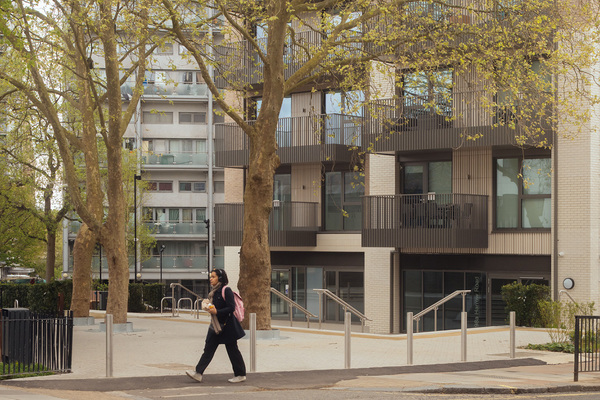You are viewing 1 of your 1 free articles
What do developing landlords want from the new government?
Just days after the general election, Inside Housing’s new development panel gathered. What do they think governments across the UK need to do to get the sector building? Jenny Messenger reports

Earlier this month, Inside Housing launched its new development panel, made up of the organisations across the UK that have been delivering the most homes for social rent.
We wanted to tap the expertise of the social landlords that have been building significant numbers of social rent homes despite the rocky economy, COVID-19, increased regulation and – in the case of England – inconsistent grant support for the tenure.
The group gathered only days after the election, at a point when Sir Keir Starmer’s ministers had just begun setting out their intentions to reform planning and boost housebuilding. We asked the panel for advice about what governments across the UK need to do to help increase the delivery of new social homes.
The new government has bold intentions to build 1.5 million homes over the course of this parliament. “Whatever they do now has to be incredibly quick, because there’s no way you’re going to ramp up more numbers in 24 months,” says Gerraint Oakley, executive director of growth and development at Platform Housing Group.
As the discussion makes bluntly clear, many social landlords will have to cut their pipelines, not expand them – unless something changes. Inside Housing’s Biggest Builders survey reported a 27% drop in starts on sites of new homes in 2023-24. Peabody was in the top 10 biggest builders, and has been a top builder of social rent homes in the past decade. But its starts for this financial year will be “around 10% of our historic average”, says Angela Wood, deputy executive director for development at the association and chair of the G15 Development Directors Group. “Across the G15, this year starts are going to drop by 76%.”
The G15’s members are reacting to strong headwinds: increasing costs as they invest in existing homes driven by fire safety and disrepair, at a time when building costs have been driven up by inflation.
“I’ve got a pipeline of just under 3,000 [homes] that I’ve had to pause, because we can’t afford to borrow to build. They’re good and ready – if the money was available, we would just go ahead and build them,” says Hakeem Osinaike, strategic director of housing at Southwark Council.
One problem is that social housing is flying out of the door faster than it is being built because of the Right to Buy. Adunni Adams, lead senior project manager at Ealing Council, says changing this would make a huge difference. “It’s about trying to hang on to the stock that we’ve got, and not continuing with this wholescale selling-off of it,” she says.
These pressures are not just being felt in England, of course. In Northern Ireland, Jan Sloan, executive director of development and new business at Clanmil Housing, calls for further investment in infrastructure. “Housing associations in Northern Ireland are having to pick up the tab to deliver on that infrastructure ask. We’re having to find solutions to upgrade wastewater treatment – all of that,” she says.
She also notes that there is no standalone decarbonisation fund in Northern Ireland, which, if brought in, “would help in many ways to allow us to focus on creating those long-term homes that create sustainable communities”.
We are gathered on Teams only a few days after the Westminster election, and already there is quite a bit of housing policy to react to. Will any of this start to turn those numbers around?
Chancellor Rachel Reeves announced shortly before our meeting her intention to bring back compulsory housing targets – something that had been scrapped by the Conservatives. Other planning reforms that could ease development include changing the definition of green belt to make it easier to build on ‘grey belt’ – land within the green belt that has already been developed.
Helen Moore, group director of Orbit Homes, Orbit Group’s development arm, welcomes the return of housing targets, which she calls “absolutely critical”, with their absence being “so detrimental in the last 18 months”.
Planning reform is also top of the agenda for many as the government looks to consult on revisions to the National Planning Policy Framework. Ms Moore says her ask is to “depoliticise the planning process”.
“I know that is a huge challenge,” she acknowledges, suggesting that local communities could have their say at the outline stage, but reserved matters consent could be “left with the experts in the field to judge it against the policy”.
“I’ve got a pipeline of just under 3,000 [homes] that I’ve had to pause, because we can’t afford to borrow to build. They’re good and ready – if the money was available, we would just go ahead and build them”
Jacqueline Esimaje-Heath, growth director at L&Q, says that extra resourcing is needed throughout the planning system, not just “the statutory planning system, but actually all of the ancillary departments and agencies that are involved”.
Good news, then, that the new government has announced it will add 300 planning officers to councils? “Of course, 300 planning officers will be welcome,” Ms Moore says. This is about “one each” when divided between all the council planning departments, she adds. “That’s not going to solve the problem, but it’s useful.”
In a sign of the general tenor, take the comment by Mollie Mills O’Brien, senior development manager at Westminster Council. She welcomes the return of housing targets to the planning system. But, she says: “We need direct assistance on acquiring homes to enable developments and loan guarantees.”
Westminster, she points out, has spent more than £250m in the past few years on rebuying Right to Buy homes before its big regeneration projects can even begin.
So what other levers should the new government pull? One of the big asks is not more money – it is more long-term certainty. For starters, in England the Affordable Homes Programme is usually set for a five-year period.
“We need to have a longer programme,” Ms Wood from Peabody says. “We’d advocate 10 years.”
1.5 million
Number of homes the Labour government plans to build over the course of this parliament
76%
Expected fall in starts among London’s biggest housing associations this year
Another big ask? For many around the virtual table, rent freezes, and the limits on rent rises put in place during high inflation, are still causing issues. One antidote could be a long-term rent settlement.
Mr Osinaike says: “The government has been interfering in rent-setting for a significant period now, which has stripped away billions of pounds from the HRA [Housing Revenue Account],” he says.
Councils are needing to spend much more on their homes to meet regulatory requirements, which in combination with lower rental income means that the HRA “across local authorities at the moment is under serious pressure”.
“I think that if we could get the five-year rent policy sorted, that would actually give us certainty of the income coming in. That would also help to give more confidence to invest into new homes as well as, obviously, all the work that we need to do on our existing stock,” Ms Moore says.
Ms Wood from Peabody thinks the government should go further. “We would support and advocate a long-term settlement of 15 years, but with 10 years being the minimum. We think that should be Consumer Price Index plus 1%,” she says. “Importantly, we think it should be enshrined in law, so that it can’t change. That’s the only thing that’s going to give us certainty and it would come at no capital cost to government.”
Face up to reality
But, as the panel discusses, the issues facing the government go well beyond its direct levers of control with social landlords. The construction industry is struggling.
“We can find all the land and we can have all the grants”, but there is a “dearth” of construction companies to build the homes, says Gareth Jones, development director at LiveWest. He adds that “whatever the government can do to help capacity build within the construction industry” would be helpful.
Mr Oakley from Platform adds that the consolidation of volume house builders such as Bellway and Crest Nicholson is also leading to a smaller pool of available builders. “There are fewer and fewer capacity builders with that supply chain available to go to,” he says.
SMEs are continuing to struggle in a tough economic environment. “We’ve got 11 on our build programme that are now asking for help for liquidity issues, and that’s going to hugely impact the regional development,” Mr Oakley says.
Could the government do more to support the construction sector? Joe Marshall, regional managing director at Sovereign Network Group, poses the question. “Who is going to be building beneath that tier of national house builders?” he asks. “Is there a role for government or Homes England to take a more supportive view of how those SME house builders can deliver our programmes for us, but also grow and flourish?”
“The government has been interfering in rent-setting for a significant period now, which has stripped away billions of pounds from the HRA [Housing Revenue Account]”
Peter Martin, managing director for development at Sanctuary, says that housing associations might just have to rethink how much building they can do. “The sector needs to be realistic. It needs to stop lecturing other parts of the process about what they have to do and start facing up to the reality of who they are and what they can deliver,” he says.
“If the capacity and financial capacity of [registered providers] are stretched and are correctly stretched by reinvesting in their own stock, which is just necessary, then it has to be honest about what it can build.”
One option could be, Mr Martin adds, to “copy the Scottish model”. Sanctuary operates in Scotland and England. “The grant rate is 50% to 55% of the build costs. It really is that straightforward,” he says.
This is not just about “putting more money on the table”, he says, but to do with “readjusting the grant structure and making it more flexible”.
“Rather than reinventing wheels and going through different bidding programmes, there is a system that has worked perfectly well in Scotland and is delivering social rent in larger numbers.”
Mr Oakley points out that, at present in England, social landlords are often too reliant on market sale to build affordable homes. “While the market is still controlled on output from market sales, we won’t be able to shift it the way we want to shift it,” he says. “I think we’ve got to be really honest about that, until that shift is back into building for need by these housing associations around the table.”
There is also talk of how the sector can better work together. Martyn Blackman, chief investment officer at Bromford, stresses the need to reflect on what partnership looks like. “It’s something that we’ve not really been able to unlock – how we work together to benefit from the capacity that we have got.”
The prominence of housing among the new government’s initial announcements is encouraging, everyone agrees. Mr Marshall says the signs are “positive” that Labour views housing as crucial to its plans for the UK’s growth and “to be seen as a kind of national infrastructure rather than something that’s just a footnote”.
Recent longform articles by Jenny Messenger
What is really happening with Section 106?
As developers raise the alarm about fewer social landlords buying Section 106 properties, Inside Housing’s exclusive data reveals how much affordable housing is delivered this way – and how much is in the pipeline. Jenny Messenger reports
In detail: what the NPPF changes mean for housing delivery
With the redrafted National Planning Policy Framework out for an eight-week consultation, James Riding and Jenny Messenger analyse the implications of a document that seeks to encourage large-scale housebuilding and reverse many of the previous government’s policies
The chief executive who has experienced the sharp end of the housing crisis
Sarah Ireland has just taken on the top job at Accent on an interim basis. Jenny Messenger finds out about her plans and how her experience in temporary accommodation informs her thinking today
Wales’ 20,000 social rent target will ‘be touch and go, but we’ll still make it’ – minister
Can the Welsh Labour government make good on its pledge to build 20,000 social homes by mid-2026? Jenny Messenger talks to Julie James, the Welsh government’s cabinet secretary for housing, local government and planning
Sign up for our development and finance newsletter
Already have an account? Click here to manage your newsletters











